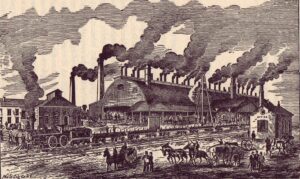T he challenge of brain drain has existed for years in areas around the nation. The South is no different, although perhaps more exaggerated and slower to respond. As I grew up in Social Circle, all I wanted to do was get the hell out of my small town and find a job, home, and surroundings that seemed to fit me more than from whence I came. Many college-age kids and younger are the same. This is not to say I do not deeply love Walton County (God’s country) and recognize the idyllic childhood I had there. I grew up recognizing I was a square peg in a round hole, and I felt like an escape would provide the upward mobility I sought while not interfering with/ ruffling the feathers of those within the cultural climate I was reared. The early recognition that I was a bit different forced me to reconcile that staying in my small town would mean a constant outsider feeling accompanied with a general uphill battle for any of my ideas and presence in certain circles. So like a number of youth across the nation, I left and come back for family visits, events of friends who stayed behind and not much else. I wait with baited breath for Walton County’s prosperity and commercial growth. I sing its praises as often as I am able and I encourage as many to move there as possible, yet the struggle to be accepted as I am (more progressive, assertive, and business oriented) will always halt any dreams of returning.
he challenge of brain drain has existed for years in areas around the nation. The South is no different, although perhaps more exaggerated and slower to respond. As I grew up in Social Circle, all I wanted to do was get the hell out of my small town and find a job, home, and surroundings that seemed to fit me more than from whence I came. Many college-age kids and younger are the same. This is not to say I do not deeply love Walton County (God’s country) and recognize the idyllic childhood I had there. I grew up recognizing I was a square peg in a round hole, and I felt like an escape would provide the upward mobility I sought while not interfering with/ ruffling the feathers of those within the cultural climate I was reared. The early recognition that I was a bit different forced me to reconcile that staying in my small town would mean a constant outsider feeling accompanied with a general uphill battle for any of my ideas and presence in certain circles. So like a number of youth across the nation, I left and come back for family visits, events of friends who stayed behind and not much else. I wait with baited breath for Walton County’s prosperity and commercial growth. I sing its praises as often as I am able and I encourage as many to move there as possible, yet the struggle to be accepted as I am (more progressive, assertive, and business oriented) will always halt any dreams of returning.
But what if an entire generation chooses to leave their home towns? What if few decide to come back? What happens to the rural small towns they leave and how do those towns sustain themselves over time? What happens when my generation reverses white flight and we all move back into urban areas?
You may have noticed it in your own town and among your own neighbors. My generation has little patience for lack of amenities and we frankly do not comprehend how you work or live without reliable WiFi. This isn’t unique to a certain area of the Southeast. This is representative of a larger generational shift across the nation. The opportunity to be something other than someone’s child has its own draw, and readily available choices of higher paying jobs is incredibly seductive.
In the last six months I have engaged in a leadership class called Georgia Forward. Initially a nonprofit offshoot from Central Atlanta Progress, this organization partners with cities around Georgia to produce solutions to the local community’s challenges. These challenges are identified by a steering committee of local officials (namely the local Chamber, from what I can tell), and are then posed in the form of questions to the group of fifty class members, a third of which are locals.
The area to which my class was partnered is Troup County. Rich in textile history and manufacturing industry jobs, Troup County is an ideal location for Georgians to stake their claim and build their dreams. Yet the cities of LaGrange, West Point, and Hogansville are finding it challenging to attract and retain young talent. With little to no quality of place attributes (nightlife, retail establishments, civic organizations), I found myself both very familiar with and appallingly shocked as to why the residents could not recognize their own challenges. The juxtaposition of those who enjoy the non-urban lifestyle that Troup County offers is in direct contrast to the preferences of those they wish to attract and retain.
This is not new, or foreign to me. It is becoming so damn common across Georgia I often wish to beat my head against the wall in frustration. I have seen this manifest in Macon, Augusta, Monroe, on recent visits to Americus, Albany, and certainly in my hometown of Social Circle. There is a generational difference that contributes to the challenge, but also an ever-present racial one, and at its roots, economic.
I did not think of it as a generational problem across the nation until I recently finished the memoir, Hillbilly Elegy, by J.D. Vance. The book was so incredibly gripping- painfully so at times. The tome spoke such truth to the life I have known here where, albeit less violence and drugs as represented in Vance’s life, my own experience knows well the depth of family loyalty, the need for escaping one’s hometown, and the ties that forever bind us by the heartstrings to the challenges we try to leave behind. Continue reading “Brain Drain: The Southern Response to Ed and Business Atrophy” →
 Today marks the beginning of the legislative session of the Georgia General Assembly. The General Assembly has always convened in the winter months, giving a historic nod to Georgia’s agricultural economy. For me, it seems also appropriate that it sits snugly in the lull between the end of the Christian seasons of Christmas and Easter.
Today marks the beginning of the legislative session of the Georgia General Assembly. The General Assembly has always convened in the winter months, giving a historic nod to Georgia’s agricultural economy. For me, it seems also appropriate that it sits snugly in the lull between the end of the Christian seasons of Christmas and Easter. he challenge of brain drain has existed for years in areas around the nation. The South is no different, although perhaps more exaggerated and slower to respond. As I grew up in Social Circle, all I wanted to do was get the hell out of my small town and find a job, home, and surroundings that seemed to fit me more than from whence I came. Many college-age kids and younger are the same. This is not to say I do not deeply love Walton County (God’s country) and recognize the idyllic childhood I had there. I grew up recognizing I was a square peg in a round hole, and I felt like an escape would provide the upward mobility I sought while not interfering with/ ruffling the feathers of those within the cultural climate I was reared. The early recognition that I was a bit different forced me to reconcile that staying in my small town would mean a constant outsider feeling accompanied with a general uphill battle for any of my ideas and presence in certain circles. So like a number of youth across the nation, I left and come back for family visits, events of friends who stayed behind and not much else. I wait with baited breath for Walton County’s prosperity and commercial growth. I sing its praises as often as I am able and I encourage as many to move there as possible, yet the struggle to be accepted as I am (more progressive, assertive, and business oriented) will always halt any dreams of returning.
he challenge of brain drain has existed for years in areas around the nation. The South is no different, although perhaps more exaggerated and slower to respond. As I grew up in Social Circle, all I wanted to do was get the hell out of my small town and find a job, home, and surroundings that seemed to fit me more than from whence I came. Many college-age kids and younger are the same. This is not to say I do not deeply love Walton County (God’s country) and recognize the idyllic childhood I had there. I grew up recognizing I was a square peg in a round hole, and I felt like an escape would provide the upward mobility I sought while not interfering with/ ruffling the feathers of those within the cultural climate I was reared. The early recognition that I was a bit different forced me to reconcile that staying in my small town would mean a constant outsider feeling accompanied with a general uphill battle for any of my ideas and presence in certain circles. So like a number of youth across the nation, I left and come back for family visits, events of friends who stayed behind and not much else. I wait with baited breath for Walton County’s prosperity and commercial growth. I sing its praises as often as I am able and I encourage as many to move there as possible, yet the struggle to be accepted as I am (more progressive, assertive, and business oriented) will always halt any dreams of returning.


